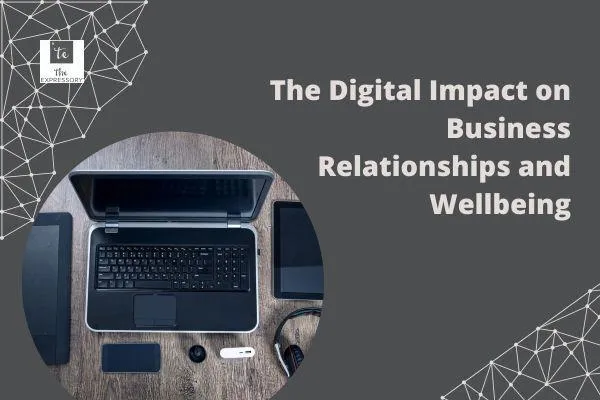
What Swimming Teaches Us About Team Relationships
In my latest video, I break down how swimming teaches us the importance of these relationship-building efforts and the specifics of what we as leaders need to nurture with our teams.
Holiday Gift Insights - What Everyone Else Is Doing
In an effort to simplify the decision-making process, we're sharing some of the trends we've seen with gifting over the years. We're even sharing our best seller and why that gift had such success.
What Makes A Successful Holiday Gift? The Travel Bag Edition
Last year we had the opportunity to work with one of our clients in the travel and tourism space to design an experience that delivered their highest engagement yet.

The Digital Impact on Business Relationships and Wellbeing
Over the last 20 years, advances in digital, social media and even AI have transformed the way we conduct business, communicate, and build relationships. From emails, smart devices, and social media, the speed of messaging is instantaneous, and technology has opened numerous avenues for connecting with the masses across borders.
However, with these advancements come challenges, particularly on the mental wellbeing front. Understanding the impact of the digital world on society’s wellbeing is essential for business leaders to continue their growth in today’s connected environment. Fostering healthy, productive relationships both internally and externally, not only positively impacts conversion, retention, and referrals, but it also shifts societal mental wellbeing for the better.
The Constant Connection Dilemma
We’re aware of the technological advancements that are happening all around us, because most of the time they shift the way our businesses operate. But we may not be aware of how it’s changing us as individuals, which impacts how we build the relationships with prospects, existing clients and even our team.
Pew Research reports show that in 2021 31% of adults reported they go online “almost constantly”. 85% say they are online daily. This constant connection can lead to:
Information Overload: We’re living in a time where we have access to far more information than we’ll ever have time to consume. And a good portion of it is being pushed at us on a constant basis. The incessant flow of emails, messages, and notifications overwhelms, causes stress and anxiety, and can lead people to block or ignore.
Loss of Focus: Humans aren't designed to multitask, even though society tells us that some of us are good at it. When we're juggling between all the things, and constant notices and interruptions, our brains aren't multitasking; they're switching tasks. This frequent switching is resource intensive. In fact, you may have heard stats that it can take from 20-30 minutes to refocus each time you switch a task. All this extra switching leads to mental fatigue and reduced concentration.
And let’s face it – Feeling busy doesn’t always equate to actual productivity. With the increase in apps, platforms, and productivity tools, it’s easy to feel like we’re making progress when we’re achieving very little. Again, all the constant juggling plus, lack of productivity might create heightened stress levels and certainly burn people out.
Fear of Missing Out (FOMO): Being continually plugged in makes some, especially the younger generations, feel they're missing out. This anxiety leads to feelings of isolation – feelings that they don’t belong and are not part of a community.
Too Much Virtual: Through the rise of improved communication tools and pandemic management, virtual has become mainstream. And it’s not only created virtual teams, but it has led to fewer face-to-face interactions overall. This lack of regular human interaction has led to a decline in connections with any depth, trust-building, and the ability to relate to one another. A UCLA study found that students who went five days without technology were significantly better at recognizing emotions in others – They were better at relating. Imagine the long-term impact on our businesses as we hire more people with limited ability to personally relate.
Negative and Harassing: Unfortunately, our digital universe has become a playground for negativity, bullying, harassment and fraud. The constant need to be vigilant can cause overwhelm and the negativity certainly fosters anxiety. For people already feeling disconnected, any of these experiences directed at them can cause further feelings of isolation and lack of belonging. It perpetuates the desire to stay disconnected.
Reduced Downtime: In generations past, waiting for meetings to start, commutes and even lunch were seen as downtime. Time to step back and recharge for a few minutes. Time to not think about work or the next errand. Now these moments are filled with checking emails, responding to a customer, and skimming social media. There is no downtime. We can’t even wait at stoplights without the itch to quickly read an email (or is that just me?). When there is no time to recharge, we live in a constant state of exhaustion. Our capacity is always reduced.
Why This Matters for Business Owners
The decline in our mental wellbeing is starting to erode the marketing, sales, and company cultural efforts of our businesses, whether we recognize it or not. Here are just a few of the ways this is showing up in business:
Remote Employee Performance: If employees are feeling disconnected from the company itself, they have limited job satisfaction and are not contributing the way they could be. They may not even realize what’s driving this disconnection. Consider finding ways to provide face to face interaction for these team members. This could be with clients, peers or even just networking. Remember, there needs to be some sense of feeling seen and belonging for the employee to feel motivated and engaged.
This same isolation could cause problems with team dynamics. Strong teams are built on trust and understanding and if remote employees don’t have enough engagement to build that bond, the lack of interpersonal relationships will lead to less collaboration. Remember to provide more opportunities for people time. They need to participate in events that are not just about work and have conversations that open up story time. This enables them to find more shared experiences for bonding. Leave plenty of space for this to develop early on, and then on a regular basis to nurture it going forward.
Customer Relationships: As we mentioned, the more we spend our time in the digital space, the less we relate to others. This means that the people engaging with your existing clients may not be great at it. Make sure that the people in charge of client relationships can relate. That they know how to make someone feel seen, heard, understood, and cared for. That they know how to listen to what’s happening in the client’s world and acknowledge it. It’s unfortunate that the people skills seem basic, but being intentional about these efforts going forward is going to become crucial to business growth.
Aside from the customer service efforts, implementing a system for your relationship building efforts with existing clients will serve you well. If people are feeling disconnected, they are going to question their importance to your business on a more frequent basis. They are going to question their initial purchase decision longer than they may have in the past. Remember, they are always online and frequently hearing stories about how others are being served. They are holding businesses to higher standards than ever before – because they can. Make sure you have a plan in place for continual touchpoints that make your clients feel cared for and understood.
Prospect Relationships: You may have noticed that your sales cycles have been increasing. We’ve certainly been hearing all about it from our clients. And it’s not surprising. When people feel disconnected, they are not likely to give up their trust so easily. They are suspicious and guarded. They want to know they are more than just a number to another company. They want to belong and feel seen. And that’s where businesses have a fantastic opportunity to not only improve their conversion but to contribute to change as well.
Your prospecting efforts will now need to include a lot more investment in the personal relationship side of things. To develop trusted relationships for the long term, people need 3 things – They need to know you understand them, experience validation from you, and they need to know you care. Your sales funnels going forward should include multiple touch points (both digital and physical) that showcase those 3 things. How can you show them that you understand their needs and their world? While doing so, can you find a way to validate what’s happening in their life or business? And finally, simply showcase your genuine care and you should be able to maintain smooth selling processes.
While technological advancement can provide great benefits for businesses, it's essential to recognize and address the challenges it creates when it comes to the people side of things. By acknowledging the issues and being committed to investing in relationships, businesses can thrive in this digital era.
At The Expressory, our purpose is to inspire organizations to invest in cultivating meaningful and lasting relationships that develop a magnetic company culture, boost business success and contribute to societal wellbeing. If you need additional inspiration or help developing a strategy for your organization, we’re always happy to help. You can join us at one of our upcoming community Q&As to discuss ideas and get your questions answered. Or you can schedule some time to talk with us directly about what strategy makes the most sense for your brand.

